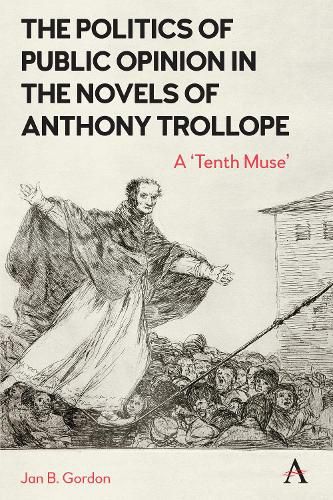Readings Newsletter
Become a Readings Member to make your shopping experience even easier.
Sign in or sign up for free!
You’re not far away from qualifying for FREE standard shipping within Australia
You’ve qualified for FREE standard shipping within Australia
The cart is loading…






The figurative body of public opinion presents challenges to readers of 19th century British fiction insofar as it lacks the markers of an autonomous subject.
It replaces direct address with intimations of surveillance and interpellation, reading characters and their actions as we read it for our situationality within it. In the novels of Anthony Trollope who continually refers to a vox populi, public opinion has an economy, as a kind of currency in which reputation is priced and marketed while itself seeming inconclusive and undeveloped, even among its self-appointed spokesmen.
It takes its place among a number of institutions that knit the country together as a a network of conveyances with different points of entry: roads, railroads, ports, and canals and the post office in which Trollope served as a civil servant for over 30 years. One such institution is the expanding bureaucracy which mediates between the people and those who regulate human activity and its exposure to government regulation. The ex-posure (literally to be placed outside oneself) is one of the ways in which public opinion, lacking a responsible subjectivity that can be held to account, removes individual subjectivity, threatening (or enabling) a rebirth in acccountability.
Yet, for all of its potentially subversive qualities, public opinion is a collective narrative - disgusing itself as a unitary voice - that often misreads character and, in the Parliamentary Novels, ideology. As it is vulnerable to being misread by politicians, public opinion also misreads, especially the arrivistes attempting to enter the social and economic life of the country. Because of its resistance to inscriptive genres, the vox populi may well represent the lost orality of the epic to which critics like Georg Lukaks have called our attention.
$9.00 standard shipping within Australia
FREE standard shipping within Australia for orders over $100.00
Express & International shipping calculated at checkout
The figurative body of public opinion presents challenges to readers of 19th century British fiction insofar as it lacks the markers of an autonomous subject.
It replaces direct address with intimations of surveillance and interpellation, reading characters and their actions as we read it for our situationality within it. In the novels of Anthony Trollope who continually refers to a vox populi, public opinion has an economy, as a kind of currency in which reputation is priced and marketed while itself seeming inconclusive and undeveloped, even among its self-appointed spokesmen.
It takes its place among a number of institutions that knit the country together as a a network of conveyances with different points of entry: roads, railroads, ports, and canals and the post office in which Trollope served as a civil servant for over 30 years. One such institution is the expanding bureaucracy which mediates between the people and those who regulate human activity and its exposure to government regulation. The ex-posure (literally to be placed outside oneself) is one of the ways in which public opinion, lacking a responsible subjectivity that can be held to account, removes individual subjectivity, threatening (or enabling) a rebirth in acccountability.
Yet, for all of its potentially subversive qualities, public opinion is a collective narrative - disgusing itself as a unitary voice - that often misreads character and, in the Parliamentary Novels, ideology. As it is vulnerable to being misread by politicians, public opinion also misreads, especially the arrivistes attempting to enter the social and economic life of the country. Because of its resistance to inscriptive genres, the vox populi may well represent the lost orality of the epic to which critics like Georg Lukaks have called our attention.